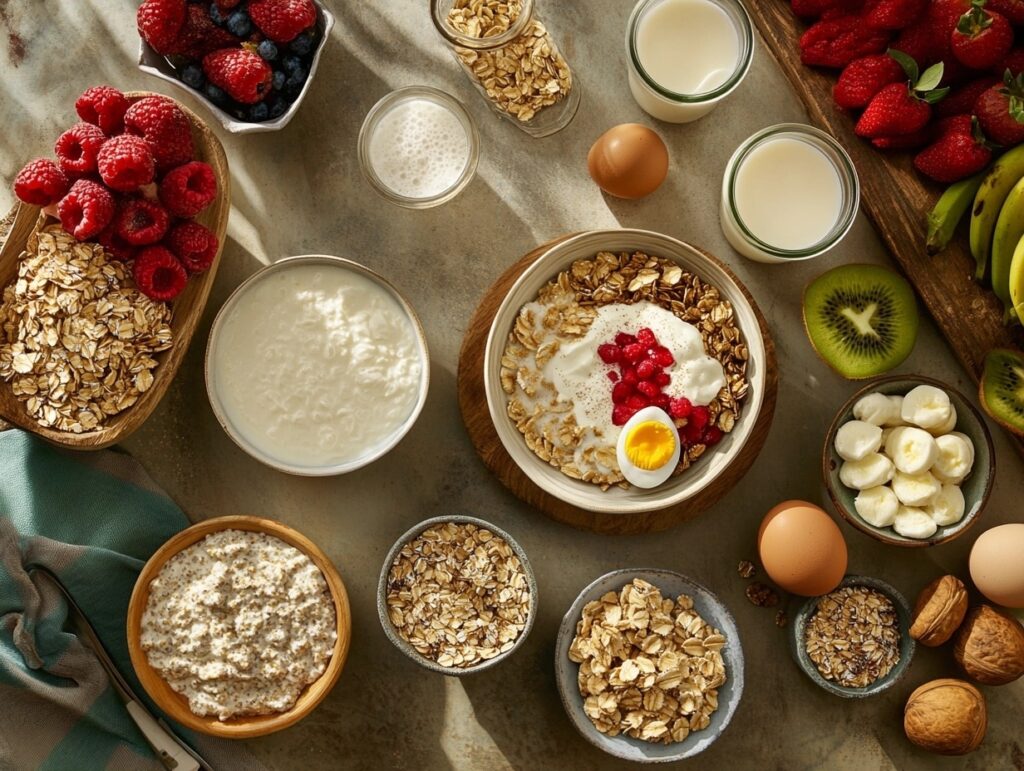Introduction
Breakfast has long been regarded as the most important meal of the day, providing the necessary energy to kickstart our mornings. But how healthy are the breakfast staples we consume daily? From cereals and fruits to dairy products and beverages, breakfast essentials are diverse, and their health benefits vary significantly based on their nutritional composition.
The purpose of this article is to evaluate the healthiness of common breakfast essentials. We’ll dive into their nutritional content, benefits, and potential concerns while offering practical tips for choosing the best options. Whether you’re a fan of quick cereals or a hearty homemade breakfast, this guide will help you make more informed decisions for a healthier start to your day.
Table of contents
Nutritional Overview

Breakfast essentials are often chosen for their convenience and nutritional value, but understanding what makes them healthy requires a closer look at their key components. A balanced breakfast should ideally include a mix of macronutrients—carbohydrates, proteins, and fats—along with essential vitamins and minerals.
Key Nutrients in Breakfast Essentials
Breakfast foods provide several vital nutrients to the body. Here’s a breakdown of the most significant ones:
- Carbohydrates:
Found in cereals, bread, and fruits, carbohydrates are the body’s primary energy source. Complex carbs from whole grains release energy gradually, keeping you full and energized for longer. - Proteins:
Protein is essential for muscle repair and growth. Breakfast staples like eggs, Greek yogurt, and nuts are excellent sources. Incorporating protein into breakfast can also stabilize blood sugar levels throughout the day. - Healthy Fats:
Fats from sources like avocados, nuts, and seeds provide long-lasting energy and support brain function. They should be consumed in moderation. - Fiber:
High-fiber foods like whole grains, fruits, and vegetables improve digestion and help maintain a healthy weight. Fiber also promotes a feeling of fullness, preventing overeating. - Micronutrients:
Breakfast essentials such as fortified cereals and dairy products are rich in vitamins (like B12 and D) and minerals (such as calcium and iron), which are crucial for overall health.
Role of Macronutrients in Breakfast
Each macronutrient serves a distinct purpose in maintaining energy balance:
- Carbohydrates fuel the brain and muscles. Consuming complex carbs in the morning supports mental focus and physical activity.
- Proteins contribute to satiety, reducing the urge for mid-morning snacks. Studies suggest that a high-protein breakfast may aid in weight management.
- Fats play a vital role in the absorption of fat-soluble vitamins like A, D, E, and K.
Ensuring the right balance of these nutrients in your breakfast can set a strong foundation for the day, both physically and mentally.
Types of Breakfast Essentials

Breakfast essentials can be grouped into various categories based on their preparation, nutritional content, and cultural preferences. Each category offers unique benefits and potential drawbacks, depending on how they are consumed.
Cereals and Grains
Cereals and grains are staples of many breakfast tables, often praised for their convenience and versatility. Common examples include oatmeal, granola, and boxed cereals.
- Oatmeal: A rich source of fiber and complex carbohydrates, oatmeal is a heart-healthy option that supports digestion and lowers cholesterol. Adding fresh fruits or nuts can enhance its nutritional profile.
- Granola: While granola can be a good source of fiber and healthy fats, many commercial options are high in sugar and calories. Opting for unsweetened versions or making granola at home can make it healthier.
- Boxed Cereals: Widely consumed for their ease of preparation, boxed cereals vary significantly in nutritional value. Look for options with whole grains, low sugar, and high fiber content.
Dairy Products
Dairy provides essential nutrients such as calcium, protein, and vitamin D. Popular breakfast options include milk, yogurt, and cheese.
- Milk: Available in various forms (whole, skim, or plant-based), milk is a versatile beverage that complements cereals or smoothies. For lactose-intolerant individuals, alternatives like almond or oat milk offer similar benefits.
- Yogurt: Greek yogurt is especially valued for its high protein content. Plain, unsweetened varieties are preferable to flavored yogurts, which often contain added sugars.
- Cheese: In moderation, cheese adds flavor and nutrients to breakfast dishes. Low-fat options provide calcium and protein without excessive saturated fats.
Fruits and Vegetables
Fruits and vegetables contribute natural sweetness, hydration, and a wealth of vitamins and minerals to breakfast.
- Fruits: Bananas, berries, and oranges are popular choices due to their convenience and high antioxidant content. Pairing fruits with protein or healthy fats can create a more balanced meal.
- Vegetables: Incorporating greens like spinach or tomatoes into omelets or smoothies boosts fiber and micronutrient intake.
Protein-Rich Foods
Protein sources like eggs, nuts, and lean meats are vital for a satisfying and energizing breakfast.
- Eggs: A nutritional powerhouse, eggs are high in protein, vitamins, and healthy fats. Whether boiled, scrambled, or poached, they are a versatile option.
- Nuts and Seeds: Almonds, chia seeds, and sunflower seeds are excellent additions to cereals or smoothies, providing healthy fats and protein.
- Lean Meats: Options like turkey bacon or grilled chicken offer protein without excessive saturated fats found in traditional bacon or sausages.
Beverages
Beverages play a significant role in breakfast routines, offering hydration and additional nutrients.
- Coffee: A morning favorite, coffee can boost mental alertness. However, excessive sugar or cream additions can diminish its health benefits.
- Tea: Green and black teas contain antioxidants that support overall health. Herbal teas can offer calming effects.
- Smoothies: Blending fruits, vegetables, and protein powders creates a nutrient-dense drink. Avoid sugary additives to maximize their health potential.
By understanding the types of breakfast essentials available, you can mix and match options to create meals tailored to your health goals and preferences.
Health Benefits of Breakfast Essentials
A nutritious breakfast plays a vital role in supporting physical and mental well-being. By understanding the benefits of breakfast essentials, you can make informed choices to optimize your health and start your day on the right note.
Energy Boost and Sustained Performance
Breakfast replenishes the body’s glycogen stores, providing an immediate source of energy after the overnight fasting period.
- Improved Physical Stamina: Carbohydrates from whole grains, such as oatmeal or whole-grain bread, fuel muscles and enhance endurance, particularly for morning exercisers.
- Steady Energy Levels: Combining carbs with protein and healthy fats—like pairing eggs with avocado toast—ensures slow and steady energy release throughout the morning.
Weight Management
Contrary to popular belief, eating breakfast can support healthy weight management by preventing overeating later in the day.
- Appetite Control: High-protein breakfasts, such as Greek yogurt with nuts, can promote satiety and reduce the likelihood of snacking on unhealthy foods.
- Boosted Metabolism: Starting the day with a balanced meal activates your metabolism, promoting calorie burning throughout the day.
Cognitive Function and Mental Clarity
The nutrients in breakfast essentials are particularly beneficial for brain health and cognitive performance.
- Enhanced Focus: Breakfasts rich in whole grains and fruits provide glucose, which is essential for concentration and memory retention. Studies show that students who eat breakfast perform better in academic settings.
- Mood Stabilization: The complex carbs found in foods like oats help regulate blood sugar levels, reducing irritability and improving mood.
Long-Term Health Benefits
Incorporating nutritious breakfast essentials into your daily routine can have lasting positive effects on overall health.
- Heart Health: Foods rich in fiber, such as whole grains and fruits, help reduce cholesterol levels, lowering the risk of heart disease.
- Diabetes Management: Balanced breakfasts prevent drastic blood sugar spikes, which is especially beneficial for individuals with diabetes or insulin resistance.
- Digestive Health: Fiber-rich foods like fruits, vegetables, and whole grains promote regular bowel movements and prevent digestive disorders.
Special Considerations for Children and Teens
Breakfast is particularly crucial for growing individuals, as it supports their developmental and educational needs.
- Growth and Development: Nutrients such as calcium and protein from dairy products contribute to bone health and muscle growth.
- Academic Performance: Studies indicate that children who eat breakfast regularly are more likely to have better grades, attendance, and behavior in school.
Incorporating healthy breakfast essentials into your daily routine is a simple yet impactful way to support your overall well-being, energy levels, and cognitive function.
Concerns and Misconceptions About Breakfast Essentials
While breakfast is often lauded as the most important meal of the day, certain breakfast essentials can pose health concerns if not chosen wisely. Misleading marketing claims, high sugar content, and large portion sizes are just a few factors to consider.
Sugar Content in Cereals
One of the most common concerns is the high sugar content in many popular breakfast cereals.
- Hidden Sugars: Cereals marketed as healthy, including granola and flavored oatmeal, often contain added sugars that can contribute to weight gain and blood sugar spikes.
- Reading Labels: Checking the nutrition label for terms like “syrup,” “honey,” or “fructose” can help identify added sugars. Look for cereals with less than 5 grams of sugar per serving.
Misleading Health Claims
Food packaging often highlights positive aspects of a product while masking less desirable qualities.
- “Low-Fat” Labels: Products labeled as low-fat may compensate with added sugars to improve flavor.
- “Whole Grain” Claims: While whole grains are beneficial, some products contain only a small percentage of whole grains combined with refined ingredients.
- “Fortified” Foods: While fortification can add vitamins and minerals, it does not necessarily make a product healthy if it is high in sugar or calories.
Portion Sizes and Overeating
Even nutritious breakfast options can lead to excess calorie intake if portion sizes are not controlled.
- Large Servings: Foods like granola, nuts, and cheese are nutrient-dense but calorie-rich. Measuring portions can prevent overeating.
- Liquid Calories: Beverages such as smoothies, coffee with cream, or sugary juices can contribute significant calories without promoting fullness.
Processed Breakfast Options
Packaged and ready-to-eat breakfasts often contain preservatives, unhealthy fats, and artificial additives.
- Breakfast Bars: While convenient, many breakfast bars are high in sugar and low in protein or fiber. Opting for bars made with whole ingredients like oats and nuts is a healthier choice.
- Frozen Breakfasts: Options like frozen pancakes or breakfast sandwiches are often loaded with sodium and lack fresh nutrients.
Skipping Breakfast vs. Eating Poorly
Skipping breakfast is sometimes seen as an alternative to consuming unhealthy options. However, this can also lead to negative health outcomes.
- Increased Hunger: Skipping breakfast can cause intense hunger later in the day, leading to overeating or unhealthy snacking.
- Impact on Energy Levels: Without breakfast, the body lacks the fuel it needs to maintain energy and focus during the morning.
Balancing Convenience with Health
For individuals with busy lifestyles, balancing convenience with nutrition is key.
- On-the-Go Options: Pre-made breakfasts like overnight oats or hard-boiled eggs can be both quick and nutritious.
- Meal Prep: Preparing breakfast components in advance can save time while ensuring balanced meals.
By addressing these concerns and debunking misconceptions, individuals can make more informed choices about their breakfast essentials, paving the way for healthier eating habits.
Choosing the Right Breakfast Essentials

Selecting the right breakfast essentials involves understanding your nutritional needs, reading product labels, and being mindful of portion sizes. With careful choices, breakfast can provide the foundation for a healthy and productive day.
Tips for Selecting Healthy Options
Choosing wholesome breakfast foods requires focusing on nutrient density and balance.
- Prioritize Whole Foods: Incorporate natural, minimally processed ingredients like fresh fruits, whole grains, and lean proteins.
- Balance Macronutrients: Aim to include a combination of carbs, proteins, and healthy fats in each meal. For example, pair whole-grain toast with avocado and an egg for a balanced breakfast.
- Avoid Added Sugars: Opt for unsweetened versions of popular items like yogurt, oatmeal, or nut butters to reduce sugar intake.
- Include Fiber: Foods like berries, chia seeds, and whole grains promote digestion and satiety.
Reading Nutrition Labels
Understanding food labels is a crucial step in evaluating breakfast products.
- Ingredient List: Look for short, simple ingredient lists. Ingredients are listed by weight, so items at the top make up most of the product.
- Sugar Content: Check for added sugars, often listed under names like “cane sugar,” “corn syrup,” or “molasses.” Aim for less than 5 grams per serving.
- Fiber and Protein: Foods high in fiber (at least 3 grams per serving) and protein (around 10 grams per serving) are more filling and nutritious.
- Sodium Levels: Processed breakfast options can be high in sodium. Look for products with less than 150 mg per serving when possible.
Making Homemade Breakfasts
Homemade meals allow for complete control over ingredients and portion sizes.
- DIY Cereal: Combine rolled oats, nuts, seeds, and a touch of honey for a customized, low-sugar cereal.
- Smoothie Bowls: Blend fresh or frozen fruits with spinach, yogurt, and almond milk, then top with granola and chia seeds for a nutrient-packed breakfast.
- Egg-Based Dishes: Prepare scrambled eggs with spinach and tomatoes or bake a batch of egg muffins for the week.
Budget-Friendly Healthy Choices
Eating healthy doesn’t have to break the bank. Affordable options include:
- Seasonal Produce: Buying fruits and vegetables in season reduces costs and ensures freshness.
- Bulk Buying: Stock up on staples like oats, rice, and nuts in bulk to save money over time.
- Meal Prep: Preparing breakfasts in advance minimizes waste and allows you to use ingredients efficiently.
Breakfast for Special Diets
Those with specific dietary needs can still enjoy nutritious breakfasts with slight modifications.
- Gluten-Free: Use gluten-free oats, quinoa, or rice cakes as substitutes for traditional grains.
- Plant-Based: Incorporate plant proteins like tofu, legumes, or nut butter into your morning meal.
- Low-Carb: Focus on protein and fat sources like eggs, avocado, and cheese while reducing bread or grain intake.
Practical Ideas for Busy Mornings
For those with limited time, these quick options can ensure a healthy start:
- Overnight Oats: Combine oats, milk, and toppings in a jar the night before for a ready-to-eat meal in the morning.
- Grab-and-Go Snacks: Prepare boiled eggs, fruit, or yogurt cups for a nutritious meal on the move.
- Freezer-Friendly Foods: Make and freeze breakfast burritos, muffins, or pancakes for easy reheating.
By learning how to select and prepare the right breakfast essentials, individuals can enhance their health without sacrificing convenience or taste.
Impact of Skipping Breakfast
The decision to skip breakfast often sparks debate, with some touting its benefits for weight management and others warning of potential health drawbacks. While skipping breakfast may suit certain lifestyles or diets, it can have significant impacts on physical, mental, and emotional health.
Effects on Metabolism
Breakfast plays a crucial role in kickstarting the body’s metabolism after an overnight fast.
- Delayed Calorie Burn: Skipping breakfast may slow down metabolism, making it harder for the body to burn calories efficiently throughout the day.
- Fat Storage: When breakfast is skipped, the body may enter “starvation mode,” leading to fat storage as a survival mechanism.
- Hunger Hormones: Going without breakfast can increase levels of ghrelin (the hunger hormone), prompting overeating later.
Impact on Energy Levels
A balanced breakfast replenishes glycogen stores and provides immediate energy. Without it:
- Fatigue: The lack of energy sources can result in sluggishness and a reduced ability to perform daily tasks effectively.
- Brain Fog: Skipping breakfast deprives the brain of glucose, leading to difficulty concentrating, poor memory, and lower productivity.
- Irritability: Blood sugar imbalances caused by fasting can affect mood, resulting in irritability and stress.
Influence on Weight Management
Skipping breakfast is often viewed as a calorie-cutting strategy, but research suggests it can have unintended consequences.
- Increased Appetite: Missing breakfast may lead to stronger cravings for high-calorie, nutrient-poor foods later in the day.
- Binge Eating: The tendency to eat larger portions during lunch or dinner may offset the calories “saved” by skipping breakfast.
- Diet Quality: Individuals who skip breakfast often miss out on important nutrients typically consumed during the morning meal.
Effects on Cognitive Function
Breakfast has a particularly profound impact on brain performance, especially in children and adolescents.
- Academic Performance: Studies show that children who eat breakfast perform better on tests, have higher attendance rates, and display fewer behavioral issues.
- Mental Sharpness: Adults who consume a morning meal demonstrate improved focus and problem-solving skills compared to those who skip it.
Long-Term Health Risks
Consistently skipping breakfast can contribute to several chronic health issues.
- Heart Disease: Research suggests a correlation between skipping breakfast and an increased risk of heart conditions due to factors like elevated cholesterol and high blood pressure.
- Type 2 Diabetes: Skipping breakfast has been linked to impaired insulin sensitivity, increasing the likelihood of developing Type 2 diabetes.
- Obesity: Studies indicate that breakfast skippers are more likely to have higher body mass indexes (BMIs), which can contribute to obesity-related conditions.
Exceptions and Considerations
While breakfast is vital for most, there are exceptions where skipping it might not pose significant risks.
- Intermittent Fasting: Individuals following intermittent fasting may skip breakfast as part of their routine. In these cases, the focus should shift to maintaining nutrient-dense meals during eating windows.
- Personal Preferences: Some people feel better and more energetic without breakfast. Listening to your body’s hunger signals is crucial.
While skipping breakfast occasionally might not harm overall health, regularly doing so could lead to energy deficits, cognitive challenges, and long-term health risks. Striking a balance based on individual needs and lifestyle is essential.
Sustainability and Breakfast Essentials

Sustainability is becoming an increasingly important factor in food choices, including breakfast essentials. By understanding the environmental impact of popular breakfast foods and adopting more sustainable practices, individuals can contribute to a healthier planet while maintaining a nutritious diet.
Environmental Impact of Breakfast Choices
The production, transportation, and packaging of breakfast foods can have a significant ecological footprint.
- Cereal Production: The cultivation of grains like wheat and oats requires considerable water and land resources. Additionally, the processing and packaging of cereals contribute to greenhouse gas emissions.
- Dairy Products: Milk, yogurt, and cheese production are associated with high levels of methane emissions, primarily from livestock. Large-scale dairy farming also requires substantial water and feed.
- Meat and Eggs: Breakfast proteins like bacon and sausages have a high environmental cost due to intensive animal farming, while eggs generally have a lower but still notable carbon footprint.
Reducing Waste
Breakfast habits can be modified to minimize food and packaging waste.
- Buy in Bulk: Purchasing oats, nuts, and other non-perishable items in bulk reduces packaging waste.
- Compost Food Scraps: Peels, eggshells, and coffee grounds can be composted instead of discarded.
- Minimize Leftovers: Preparing only what you need for breakfast prevents food waste and reduces overconsumption.
Sustainable Alternatives for Breakfast Essentials
Choosing eco-friendly breakfast options can reduce environmental impact without sacrificing nutrition.
- Plant-Based Options: Replacing dairy with plant-based alternatives like almond, oat, or soy milk can significantly reduce carbon emissions.
- Seasonal and Local Produce: Eating fruits and vegetables that are in season and locally sourced lowers the carbon footprint associated with transportation.
- Sustainable Proteins: Opting for plant proteins such as tofu, legumes, or nuts instead of meat can help conserve resources. Eggs from free-range or pasture-raised farms are a more sustainable option than conventionally produced eggs.
Packaging and Recycling
Packaging materials for breakfast products, particularly single-use plastics, are a major environmental concern.
- Choose Recyclable Packaging: Look for cereals and other items in cardboard or recyclable packaging. Avoid individually wrapped servings to reduce waste.
- Reusable Containers: Invest in reusable containers for storing homemade breakfast items or buying in bulk.
- Support Minimal Packaging Brands: Brands that prioritize eco-friendly packaging or bulk buying programs align better with sustainable practices.
Supporting Ethical and Sustainable Brands
Supporting brands that prioritize sustainability can make a collective impact.
- Organic and Fair Trade: Choosing certified organic products ensures environmentally friendly farming practices. Fair Trade certifications indicate ethical labor practices in producing ingredients like coffee and chocolate.
- Eco-Friendly Farming Practices: Support farms that use regenerative agriculture, which restores soil health and reduces carbon emissions.
Incorporating Sustainability Into Your Routine
Making sustainability a part of your breakfast routine is easier than it seems.
- Meal Prep with Sustainability in Mind: Preparing homemade breakfasts using locally sourced and seasonal ingredients minimizes waste and environmental costs.
- Batch Cooking: Cooking in larger batches reduces energy usage and ensures that you have meals ready for busy mornings.
- Conscious Consumption: Focus on buying what you need, reducing unnecessary waste, and being mindful of your food choices.
By integrating sustainable practices into breakfast habits, individuals can reduce their ecological footprint while still enjoying nutritious and satisfying meals. Making informed choices about the environmental impact of breakfast essentials is a small but meaningful step toward a more sustainable future.
FAQ Section
What age is Breakfast Essentials for?
Breakfast Essentials, such as nutrient-rich drinks or cereals, are typically designed for individuals aged 4 and older. These products are formulated to provide essential vitamins and minerals that support growth and energy needs, particularly for children, teenagers, and adults with busy lifestyles.
However, specific formulations, like those fortified with higher protein content or tailored for seniors, may cater to different age groups. Always read the product label to ensure it meets the nutritional needs of the intended individual, and consult a pediatrician or healthcare provider for children under 4 years of age.
Can you use water instead of milk for Breakfast Essentials?
You can use water instead of milk to prepare breakfast essentials, especially powdered or liquid drink mixes. While milk provides additional nutrients such as calcium, protein, and vitamin D, water is a suitable alternative for those with lactose intolerance, dairy allergies, or dietary preferences.
Using water may result in a thinner consistency and reduced overall nutrition, so consider adding other nutrient-rich ingredients, such as a plant-based milk alternative (almond, soy, or oat milk), to boost the drink’s health benefits.
Do you put Breakfast Essentials in the fridge?
Whether you need to refrigerate Breakfast Essentials depends on the specific product.
- Ready-to-Drink Bottles: These are best kept in the fridge before consumption to maintain freshness and provide a cold, enjoyable experience.
- Powdered Mixes: Powdered Breakfast Essentials do not need refrigeration. They should be stored in a cool, dry place and prepared as directed with milk or water. Any leftover prepared drink should be refrigerated and consumed within 24 hours.
- Homemade Breakfast Essentials: If you’ve made a custom breakfast drink or smoothie, it should be stored in the fridge and consumed promptly to maintain freshness and safety.
Always check the storage instructions on the packaging to ensure proper handling.
Explore Related Breakfast Content
- For a comprehensive look at breakfast options, check out the detailed insights in Breakfast Essentials.
- Curious about fast food breakfast choices? Dive into Burger King Breakfast Menu for a unique perspective on morning meals.
- Learn what fast-food chains offer in the morning by reading What Does Burger King Serve in the Morning?.
Conclusion
Breakfast essentials play a pivotal role in providing the energy and nutrients needed to start the day right. Whether it’s cereals, dairy, fruits, or protein-rich foods, each option offers unique benefits when consumed in moderation and with balanced nutrition in mind. Understanding the nutritional content, health benefits, and potential concerns of breakfast staples empowers individuals to make informed dietary choices.
By opting for wholesome ingredients, reading nutrition labels carefully, and considering sustainable practices, breakfast can become a meal that supports not just personal health but also the well-being of the planet. Additionally, dispelling common misconceptions—such as the notion that skipping breakfast aids weight loss—highlights the importance of a well-rounded morning routine for maintaining overall health.
Ultimately, breakfast is more than just a meal; it’s an opportunity to nurture your body, mind, and environment. Whether you’re preparing homemade options or selecting ready-to-eat products, prioritize balance, sustainability, and nutritional value for a truly healthy start to your day.

